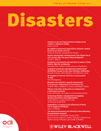
DISASTERS
Scope & Guideline
Advancing interdisciplinary insights into disaster management.
Introduction
Aims and Scopes
- Disaster Risk Management:
The journal emphasizes research on frameworks and strategies for managing disaster risks, including preparedness, response, recovery, and mitigation efforts. - Humanitarian Action and Ethics:
It explores the ethical dimensions of humanitarian aid, including the roles of various actors, power dynamics, and the implications of humanitarian interventions in crises. - Social Resilience and Community Engagement:
Research highlights the importance of community involvement and social capital in building resilience against disasters, emphasizing local knowledge and practices. - Impact of Climate Change and Environmental Factors:
The journal addresses how climate change and environmental degradation affect disaster vulnerability and the effectiveness of disaster management strategies. - Crisis Communication and Information Dissemination:
It focuses on the role of communication technologies and strategies in enhancing disaster preparedness and response, including the dissemination of vital information during emergencies. - Intersectionality and Vulnerability:
Research examines how various social identities (e.g., gender, ethnicity, socioeconomic status) intersect to influence vulnerability and resilience in disaster contexts.
Trending and Emerging
- Complex Emergencies and Multidimensional Crises:
There is an increasing focus on understanding complex emergencies that intertwine conflict, climate change, and public health crises, reflecting the need for integrated responses. - Localisation of Humanitarian Aid:
Research is trending towards the localisation of humanitarian efforts, emphasizing the need for empowering local actors and integrating community perspectives in disaster response. - Technological Innovations in Disaster Management:
Emerging studies are exploring the role of technology, including social media and data analytics, in enhancing disaster preparedness, response, and recovery efforts. - Mental Health and Well-being in Disaster Contexts:
The importance of mental health and psychosocial support in disaster recovery is increasingly recognized, with a focus on the well-being of both affected communities and humanitarian workers. - Climate Justice and Environmental Resilience:
Research is trending towards examining the intersection of climate justice and disaster resilience, highlighting the need for equitable approaches to climate adaptation and disaster risk reduction.
Declining or Waning
- Traditional Disaster Response Models:
Research centered on conventional top-down disaster response models is declining, as there is a growing recognition of the need for community-driven and participatory approaches. - Single-Hazard Focus:
There is a waning interest in studies that examine disasters in isolation, with a shift towards multi-hazard and systemic analyses that consider interconnected risks. - Historical Disaster Accounts:
The exploration of historical disasters as standalone subjects is becoming less prominent, as current research increasingly emphasizes contemporary and future-oriented disaster studies. - Aid Dependency and Critiques of Humanitarianism:
While still relevant, discussions surrounding aid dependency and critiques of humanitarianism appear less frequently as the focus shifts towards innovative and sustainable recovery practices. - Gender and Disaster Studies:
Although gender remains a critical theme, research explicitly focusing on gender roles in disaster contexts is not as prevalent, with broader discussions on intersectionality gaining prominence.
Similar Journals

Frontiers in Climate
Empowering researchers to shape a resilient future.Frontiers in Climate is a pioneering open-access journal published by FRONTIERS MEDIA SA, dedicated to advancing the understanding of climate science and its multifaceted impacts on the environment and society. Since its inception in 2019, the journal has established itself as a crucial platform for researchers and professionals, contributing significantly to fields such as atmospheric science, environmental policy, and pollution management, achieving commendable rankings within various categories. With an impressive quartile categorization of Q1 in Environmental Science (miscellaneous), Management, Monitoring, Policy and Law, and Pollution, as well as Q2 in Atmospheric Science and Global and Planetary Change for the year 2023, it reflects high-quality scholarly output and relevance in the academic community. The journal's commitment to open access ensures that vital research is accessible to all, fostering collaboration and innovation in tackling the pressing issues related to climate change. Whether you are a researcher, policymaker, or student, Frontiers in Climate is an essential resource for advancing knowledge and implementing solutions for a sustainable future.
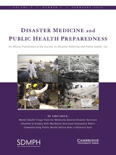
Disaster Medicine and Public Health Preparedness
Empowering research for resilient health systems.Disaster Medicine and Public Health Preparedness is a pivotal journal published by Cambridge University Press, dedicated to advancing the field of disaster medicine and public health. With an ISSN of 1935-7893 and an E-ISSN of 1938-744X, this journal holds a commendable place in the academic discourse, featuring a 2023 Scopus ranking of #221 out of 665 in the category of Public Health, Environmental and Occupational Health, placing it in the 66th percentile. It enjoys a Q2 quartile ranking, which underscores its significant contributions to the field. The journal, spanning from 2007 to 2024, serves as a critical platform for researchers, professionals, and students aiming to share innovative findings and best practices in preparing for and responding to public health emergencies. Though not available as Open Access, its rigorous peer-review process ensures high-quality publications that are relevant in addressing contemporary challenges in disaster preparedness. Operating out of the UK, specifically from Edinburgh Building, Shaftesbury Rd, Cambridge, this journal plays an integral role in policy formulation and educational efforts in public health, making it an essential resource for scholars intending to impact the sector meaningfully.
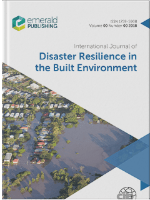
International Journal of Disaster Resilience in the Built Environment
Fostering collaboration for safer environments.International Journal of Disaster Resilience in the Built Environment is a leading peer-reviewed journal published by Emerald Group Publishing Ltd, focusing on the crucial intersection of disaster resilience and the built environment. Established in 2010, this journal serves as an essential platform for researchers, professionals, and students engaged in the fields of Building and Construction, as well as Safety, Risk, Reliability and Quality, maintaining a respectable Q3 ranking in both categories as of 2023. With a commitment to enhancing global knowledge on resilient construction practices, the journal examines innovative strategies to mitigate risk and enhance safety in built structures. Despite its robust academic reputation, it currently operates without an open access model, emphasizing its curated approach to high-quality scholarship. The publication aims to foster interdisciplinary collaboration and advance the development of sustainable practices within the context of disaster risk reduction, making it a vital resource for anyone dedicated to improving resilience in the built environment.

Risk Hazards & Crisis in Public Policy
Illuminating pathways to effective crisis management.Risk Hazards & Crisis in Public Policy is a leading academic journal published by WILEY, focusing on the interdisciplinary study of risks and crises as they pertain to public policy. Since its inception in 2010, this journal has established itself prominently in the field, currently holding a Q2 quartile ranking in Public Administration and boasting an impressive Scopus percentile of 89, ranking it 24 out of 232 journals in its category. This demonstrates its significant influence and relevance among peer-reviewed publications. The journal serves as a critical platform for researchers, policymakers, and practitioners to share innovative research, insightful analyses, and practical solutions related to the management and mitigation of risks in public administration. Although it does not currently offer open access options, it continues to provide vital insights into burgeoning issues within the domain, making it an essential resource for anyone interested in advancing their understanding of risk management in public policy contexts.
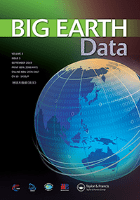
Big Earth Data
Innovating Insights Through Big Data in Earth SciencesBig Earth Data is a prestigious open-access journal that has been at the forefront of advancing research in the intersection of earth science and computer technology since its inception in 2017. Published by TAYLOR & FRANCIS LTD in the United Kingdom, this journal is dedicated to disseminating groundbreaking findings and innovative methodologies in the fields of Earth and Planetary Sciences and Computer Science Applications. With a commendable impact factor and an impressive positioning in the Scopus rankings—claiming Q1 status in Computers in Earth Sciences and Q2 in Computer Science Applications—it serves as a vital resource for researchers, professionals, and students alike. The journal encourages submissions that explore the integration of big data technologies in managing, analyzing, and visualizing earth-related data, thereby fostering interdisciplinary collaboration. Since embracing its open-access model, Big Earth Data has enhanced the accessibility of high-quality research, promoting a broader dialogue in the scientific community and contributing to informed decision-making in global environmental challenges.
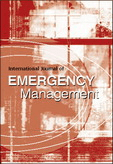
International Journal of Emergency Management
Exploring innovative solutions in disaster preparedness and response.International Journal of Emergency Management is a reputable publication within the fields of emergency medicine and strategic management, published by InderScience Enterprises Ltd. With its ISSN 1471-4825 and E-ISSN 1741-5071, this journal has been a crucial platform for scholarly research since its inception in 2003. The journal aims to disseminate high-quality, peer-reviewed articles that address critical issues related to emergency management, including but not limited to disaster preparedness, response strategies, recovery methods, and risk assessment. Despite being categorized in Q4 of both emergency medicine and strategy and management in 2023, the journal serves as an essential resource for researchers, professionals, and students looking to further explore the evolving dynamics of emergency management. It leverages its global presence, with its headquarters located in the United Kingdom, thus attracting a diverse array of contributions addressing international and interdisciplinary perspectives. The journal fosters an environment where innovative ideas can flourish, ultimately contributing towards enhancing global emergency management practices.

Journal of Safety Science and Resilience
Advancing safety knowledge for a resilient future.Welcome to the Journal of Safety Science and Resilience, a pioneering platform dedicated to advancing knowledge in the fields of safety, risk, reliability, and quality. Published by KEAI PUBLISHING LTD and based in China, this Open Access journal has made significant strides since its inception in 2020. With an impressive impact factor and a distinguished Q1 ranking in various categories, including Safety Research and Safety, Risk, Reliability and Quality, it serves as an authoritative resource for researchers, professionals, and students alike. The journal's commitment to disseminating high-quality research is reflected in its exceptional Scopus rankings, with top positions in decision sciences and social sciences. As we converge into the future with volumes planned up to 2024, engaging contributions focused on contemporary challenges and innovations in safety science are more essential than ever. Explore groundbreaking studies and elevate your understanding of resilience in the face of uncertainty through this invaluable academic resource.
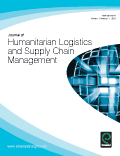
Journal of Humanitarian Logistics and Supply Chain Management
Pioneering insights for responsive humanitarian operations.Journal of Humanitarian Logistics and Supply Chain Management is a premier academic journal published by Emerald Group Publishing Ltd that addresses the critical intersection of logistics and supply chain management within humanitarian contexts. With an ISSN of 2042-6747 and an E-ISSN of 2042-6755, this journal has established itself as a leading resource for researchers, professionals, and students dedicated to enhancing operational efficiency and effectiveness in disaster relief and humanitarian aid. The journal enjoys a distinguished standing with a Q1 ranking in Management Information Systems and a Q2 ranking in Management Science and Operations Research, reflecting its contributions to the field and its significant impact factor, placing it in the 75th percentile among its peers in Scopus rankings. Covering a spectrum of topics from innovative supply chain strategies to responsive logistics frameworks, the Journal of Humanitarian Logistics and Supply Chain Management provides valuable insights and practical solutions that are essential for enhancing resilience and responsiveness in humanitarian operations as it converges through the years from 2011 to 2024. Researchers and industry practitioners alike are encouraged to engage with its robust articles, fostering collaboration and knowledge exchange to meet the evolving challenges faced in humanitarian logistics.

International Journal of Disaster Risk Science
Championing open-access research for global disaster risk awareness.The International Journal of Disaster Risk Science, with ISSN 2095-0055 and E-ISSN 2192-6395, is a premier, peer-reviewed open-access journal published by Springer. Since its inception in 2011, the journal has been dedicated to advancing knowledge and practice in the field of disaster risk science, facilitating critical discussions around disaster preparedness, response, and resilience across various regions of the globe. This journal holds impressive rankings, including Q1 in Geography, Planning and Development, and Q1 in Safety Research for 2023, confirming its high impact within the academic community. With converged publication years from 2010 to 2024 and being ranked in the top 10% in multiple categories, it serves as an essential resource for researchers, professionals, and students alike. As an open-access journal, it ensures that cutting-edge research is freely available, promoting wider dissemination and engagement with topical issues in disaster risk management.
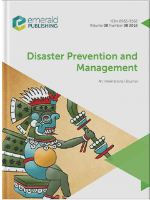
Disaster Prevention and Management
Exploring multidisciplinary strategies for disaster management.Disaster Prevention and Management, published by Emerald Group Publishing Ltd, is a leading journal in the fields of disaster management, public health, and environmental policy. With an ISSN of 0965-3562 and an E-ISSN of 1758-6100, this journal has made significant contributions to both theoretical and practical advancements since its inception in 1992. Operating from the United Kingdom, it holds a Q2 ranking across various categories, including Business, Management and Accounting, Health (Social Science), and Public Health, reflecting its pivotal role in academic discourse and policy formulation. By engaging with contemporary issues related to disaster risk reduction, emergency preparedness, and resilience strategies, Disaster Prevention and Management aims to foster a multidisciplinary approach, making it a vital resource for researchers, practitioners, and students seeking to navigate the complexities of disaster scenarios effectively. With an impressive Scopus ranking across multiple categories, researchers are encouraged to explore its diverse range of articles and reports available for their academic and professional endeavors.